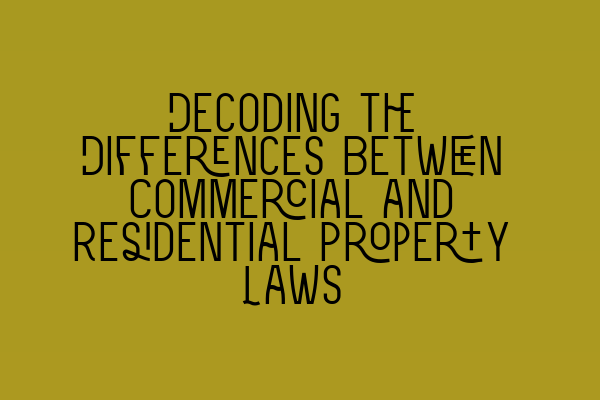Decoding the Differences Between Commercial and Residential Property Laws
When it comes to property law, there are several distinct categories that govern different types of properties. Two important categories in property law are commercial and residential properties. While both involve legal aspects related to real estate, they differ significantly in their purpose, regulations, and legal requirements. In this article, we will dive deep into the world of commercial and residential property laws, helping you understand the key differences between the two.
Commercial Property Law
Commercial property law pertains to properties that are primarily used for business purposes. These properties can include office buildings, retail spaces, warehouses, hotels, and more. The legal framework surrounding commercial property aims to provide a structured environment for businesses to operate, ensuring that all parties involved are protected and their rights are upheld.
Leasing and Contractual Agreements: One key aspect of commercial property law is leasing and contractual agreements. Commercial leases are typically longer and more complex than residential leases. They involve detailed negotiations between the landlord and tenant, covering aspects such as rent, lease duration, maintenance responsibilities, and potential modifications to the property. Understanding contractual capacity, rights, and limitations is crucial in ensuring both parties are on the same page and protected throughout the lease term. If you want to dive deeper into this topic, check out our article on Understanding Contractual Capacity: Rights and Limitations.
Property Ownership and Tenancy: Another important aspect of commercial property law is property ownership and tenancy. Commercial properties can be owned by corporations, partnerships, or individuals, each with unique legal responsibilities. In addition, commercial properties often involve multiple tenants or businesses operating within the same premises. These complex ownership structures require clear legal documentation to ensure the rights and responsibilities of each party are well-defined and protected.
Zoning and Planning Regulations: Zoning and planning regulations play a crucial role in commercial property law. Local authorities and governmental bodies enforce these regulations to ensure proper land use, building codes, and environmental concerns are addressed. These regulations dictate the types of commercial activities that can take place in certain areas, ensuring the overall functionality, safety, and aesthetics of a locality.
Financing and Investment: Commercial properties often involve significant investments and financing. Financing options for commercial properties differ from those for residential properties. Lenders assess commercial properties based on their potential income generation and cash flow, in addition to the property’s value. Understanding the nuances of commercial property financing is essential for investors and developers looking to navigate the intricacies of this area of law.
Residential Property Law
Residential property law focuses on properties that are primarily used for dwelling purposes. These properties can include houses, apartments, condominiums, and vacation rentals. The legal framework surrounding residential property aims to protect the rights of both landlords and tenants, ensuring fair and equitable treatment in housing matters.
Leasing and Rental Agreements: Residential leases are typically more straightforward than commercial leases and are subject to specific regulations to protect the rights of tenants. Rental agreements outline the responsibilities of both parties, including rent payment terms, lease duration, and maintenance obligations. It is important for tenants to understand their rights and responsibilities when entering into a residential lease agreement, as well as the limitations they may have in modifying the property. For a comprehensive understanding of contract law, check out our interactive SQE mock tests on Interactive SQE Mock Tests for Contract Law: Test Your Knowledge.
Tenant Rights and Protections: Residential property laws ensure that tenants are protected against unlawful eviction, discrimination, and improper landlord practices. These laws vary by jurisdiction and usually address issues such as habitability, security deposits, and landlord access to the property. Familiarizing oneself with the specific tenant rights and protections in their locality is crucial for both tenants and landlords.
Property Management: Residential properties are often managed by professional property management companies or individual landlords. Property management involves various tasks such as rent collection, property maintenance, tenant screening, and eviction procedures. Abiding by legal requirements and maintaining transparent communication with tenants are key responsibilities for property managers, ensuring that all laws and regulations are upheld.
Indemnity and Insurance: Residential property owners must consider insurance coverage in case of accidents, damage, or liability claims. Insurance policies can safeguard property owners from financial losses resulting from unforeseen events. Understanding the available insurance options and the legal implications of indemnity is important for property owners to protect their investments. If you want a detailed analysis of recent changes in contract law, you can read our article on Contract Law Reforms: An Analysis of Recent Changes.
Conclusion
Commercial and residential property laws serve different purposes and cater to distinct needs within the real estate industry. For those who own or intend to invest in either commercial or residential properties, having a solid understanding of the applicable legal framework is essential for successful property management, leasing, and investment activities. Whether you are a landlord, tenant, investor, or property manager, staying up-to-date with property law regulations and seeking legal advice when necessary will ensure that you navigate the complexities of property transactions in a legally compliant manner.
We hope this article has provided you with a comprehensive overview of the differences between commercial and residential property laws. To further enhance your knowledge in property law and related topics, we invite you to join our SQE Contract Law Webinars for expert insights and guidance. If you’re specifically interested in understanding the rights and responsibilities of parties in a contract, our article on Parties in a Contract: Rights and Responsibilities is a valuable resource. We are committed to helping you expand your legal knowledge and excel in your career in property law.
